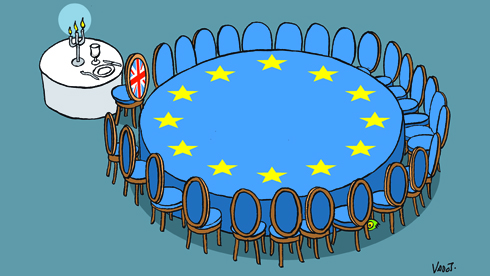To an outsider here in Brussels, Britain’s stance toward Europe is utterly incomprehensible.
Like it or not, the European Union is the largest market in the world, while the unification process has ensured that, for the first time in our continent’s history, war is just a distant memory of the past, not a bleak prospect for the future.
Take every issue that really matters to our troubled world, from environmental protection to human rights, democracy and peace, and you will see that Europe is a global leader and a prominent force for good.
Missed opportunities
The UK could play a leading role in the process of reforming and strengthening the EU, possibly the leading role.
But under the Conservatives, the UK has already given up on this prospect, almost as if this economic and political giant right on its shores didn’t exist.
No matter what Prime Minister David Cameron says in his Europe speech this Friday, the ugly truth is that for diplomats, lobbyists and the media in Brussels, the UK has not just failed to capitalise on its potential, but has already assumed an “observer status” in the EU.
Update on 17 January, 9PM: British Prime minister has cancelled his Amsterdam speech on EU following the hostage crisis in Southern Algeria. — Presseurop
View from the Netherlands
Cameron would be better to stay at home
"If David Cameron is coming to the Netherlands just to distance his country from the European Union, then he would be better to stay at home," blasts political analyst Hylke Dijkstra in the left-of-centre daily De Volkskrant –
It is concerning that our government is giving Cameron a platform on which to announce national policy. But it is even more worrying that these proposals are not going to be in the Netherlands' interest. Let alone those of the European Union. [Cameron wants an à la carte EU. [...] If we allow Britain to renegotiate treaties, then other countries will certainly come forward with their list of demands. This is why most member countries do not support Cameron's ideas. The promised referendum [...] will eventually address the question of EU membership. [...] The EU would be able to bear the loss of Greece, but a departure by the United Kingdom would lead to a significant reduction in the economic, diplomatic and military influence of Europe. Also, smaller member states will not feel at home in a club where France and Germany are giving the orders.
What's more, Britain risks plunging the EU into uncertainty –
A British referendum will not take place until 2017 or 2018. This means that we will have to endure a long period of uncertainty, and uncertainty it is not what we need right now.
Do you like our work?
Help multilingual European journalism to thrive, without ads or paywalls. Your one-off or regular support will keep our newsroom independent. Thank you!
















